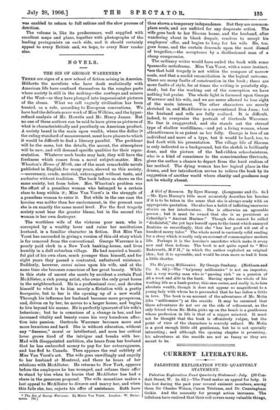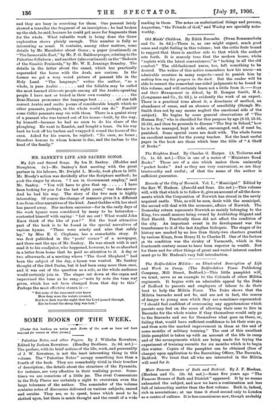CURRENT LITERATURE.
PALESTINE EXPLORATION FUND QUARTERLY STATEMENT.
Palestine Exploration Fund Quarterly Statement: July. (38 Con- duit Street, W. 2s. 6d.)—The Fund makes an appeal for help. It has lost during the past year several eminent members, among them Sir Charles Wilson, Canon Tristram, and Dr. Cunningham Geikie. And the necessity for prompt action increases.
fellaheen have realised that their soil covers many valuable things, and they are busy in searching for them. One peasant lately showed a traveller the fragment of an inscription ; he had broken up the slab, he said, because he could get more for fragments than for the whole. What valuable work is being done the Gezer exploration shows plainly enough. This number is fully as interesting as usual. It contains, among other matters, some details by Mr. Macalister about Gezer ; a paper (continued) on "The Immovable East," by Mr. P. G. Baldensperger, relating to the Palestine fellaheen ; and another (also continued) on the "Bedouin of the Sinaitic Peninsula," by Mr. W. E. Jennings Bramley. The details in the latter about the camel, which has practically superseded the horse with the Arab, are curious. In the former we get a very weird picture of peasant life in the Holy. Land. "The language," writes the author, "as a whole, is pure Arabic and the fellahin may be called the most learned illiterate people among all the Arabic-speaking people I have met or tested in their own country the
Beni-Hassan pronounce the language best all can talk correct Arabic and recite poems of considerable length which no other peasants, perhaps, in the whole world can do." PossiblY some Celtic peasants may vie with them. There is a quaint story of a peasant who was turned out of his house—built, by the way, by himself—because ho had no oxen to do his share of the ploughing. He went to Ramleh, and bought a team. On his way back he took off his turban and wrapped it round the horns of the oxen. Asked for his reason, he replied : "No oxen, no home ; therefore honour to whom honour is due, and the turban to the head of the family."







































 Previous page
Previous page